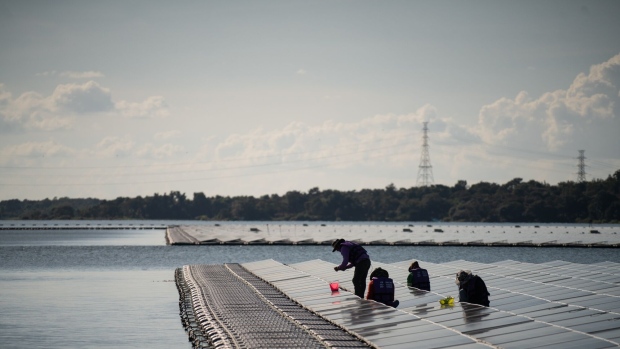Jun 7, 2024
US Moves Closer to Tariffs on Asia Solar Panels With Agency Vote
, Bloomberg News

(Bloomberg) -- The US government moved closer to imposing new tariffs on solar cells and panels from Southeast Asia after an agency’s initial determination that American manufacturers are being harmed by cheap imports from the region.
The 4-0 vote by the US International Trade Commission on Friday marks the first of four major steps in the review of petitions by manufacturers targeting solar cells and modules imported from Cambodia, Malaysia, Thailand and Vietnam. They allege the equipment is being sold at prices below the cost of production and unfairly benefits from tens of billions of dollars in subsidies, including from Chinese government entities.
In its preliminary determination, the commission found there is a reasonable indication of material injury — or a threat of it — to domestic solar manufacturers. The vote clears the way for the Commerce Department to continue its investigation into whether the foreign producers are in fact dumping their solar equipment and getting illegal government support. And it sets the stage for the collection of preliminary duties as soon as July.
The case raises the prospect of more uncertainty for US renewable power developers as well as the promise of stiffer trade protections that could bolster some domestic manufacturers. The Inflation Reduction Act delivered tens of billions of dollars in subsidies for new solar factories, but the US still depends on imports from Asia for most of its panel and cell supply.
The companies pursuing the claims as part of the American Alliance for Solar Manufacturing Trade Committee include Convalt Energy Inc., First Solar Inc., Hanwha Qcells USA Inc., and Mission Solar Energy LLC.
The alliance argues that cheap, subsidized panel imports are deterring expansions in US manufacturing capacity that have been cheered by President Joe Biden and incentivized by the Inflation Reduction Act. The result is reduced production, lower capacity utilization and harmed profits, said Tim Brightbill, co-chair of Wiley Rein LLP’s international trade practice and lead counsel for the petitioners.
“These are companies that are trying to invest in new solar manufacturing and those investments are in jeopardy because of the dumping and the subsidies from these four countries,” Brightbill said.
Chinese officials have argued new tariffs threaten to slow the speed of the US energy transition and its fight against climate change. The case has drawn opposition from some foreign manufacturers and US renewable power developers, who argue tariffs could give larger domestic manufacturers an unfair advantage and raise the cost of solar projects.
“This is a preliminary determination, and we will continue presenting information to the commission on the issue of injury, including the fact that certain US module producers appear to be thriving even with the steady flow of module imports,” said Stacy Ettinger, a senior vice president with the Solar Energy Industries Association.
Opponents have objected to the probe’s focus on crystalline silicon photovoltaic cells, regardless of whether they’ve been assembled into modules. The risk, they say, is that new duties on cells — a key final ingredient in most modules and panels — will raise the cost of producing that gear inside the US and further discourage manufacturing by companies that can’t obtain tariff-free components.
The president of Crossroads Solar Enterprises Inc., a solar module manufacturer in Indiana, highlighted the conflict in a filing with the commission, saying he is concerned about “unsustainable” dumping of panels in the US “at prices that are one-third of what it cost me for raw materials.” Yet, Pat Regan said, the trade case raises the specter of higher costs for the imported cells he needs to make modules — potentially “the death knell to small manufacturing facilities in this country.”
(Updates with further details on vote and investigation from sixth paragraph)
©2024 Bloomberg L.P.


